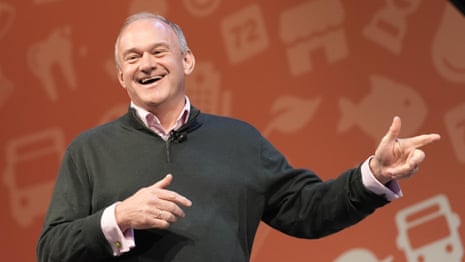Ed Davey’s speech to Lib Dem conference
Ed Davey is about to deliver his speech to the Lib Dem conference.
There is a live feed here.
Key events
Ed Davey starts with a joke about his campaign hijinks.
Do you know they wanted me to wear a wetsuit today? But I said it was abseiling or nothing?
Winning 72 seats was the best result in the party’s modern history, he says.
And Conference, how fitting it was that the final seat to declare – number 72 – was the home of one of the great champions of that more liberal society.
Our dear friend Charles Kennedy.
Davey thanks party members. And he invites them to applaud themselves.
Ed Davey, the Lib Dem leader, is on the stage now.
He is singing Abba, Take a Chance on Me.
(The last party leader who came on stage to Abba was Theresa May.)
The video is now showing some of Davey’s election campaign whacky photocall stunts.
And it ends with a reminder that the election led to a six-fold increase in the number of Lib Dem MPs.
At the Lib Dem conference they are now showing a video about Ed Davey, which starts with him talking about his decision to talk more often and more openly about his severely disabled son, and Davey’s life as a carer looking after him.
At the Lib Dem conference Daisy Cooper, the deputy leader, is welcoming the party’s 72 MPs onto the stage.
They just keep coming.
The Tories are using the government’s decision to cut winter fuel payments to help raise funds for the party, Kevin Schofield reports in a story for HuffPost UK. He says an email has been sent to to supporters urging them to “chip in any amount” to help the parties campaign against the policy.
Ed Davey’s speech to Lib Dem conference
Ed Davey is about to deliver his speech to the Lib Dem conference.
There is a live feed here.
Lammy sidesteps questions about how much extra UK will contribute to help poor countries tackle climate crisis

Fiona Harvey
David Lammy’s speech on foreign policy and the climate crisis was lauded by the ambassadors – the Azerbaijani ambassador was there, alongside the Brazilian ambassador, both of whose countries are soon to host climate Cops; and the German ambassador and representatives from the EU and other countries – as well as academics and campaigners present, who were impressed by its change of tone compared with the previous government.
But, as one ambassador noted drily afterwards, “great speech – not much detail”.
The key climate question for developing countries this year is money. Countries are gathering in Azerbaijan in November to discuss a “new collective quantified goal” on climate finance – which means, the amount that rich countries will dedicate from their public coffers to the developing world, to help vulnerable countries cut their emissions and cope with the impacts of the climate crisis.
Last time such a sum was discussed was in 2009, when the rich promised $100bn would flow in climate finance to the poor world each year by 2020. That target was missed, by a couple of years, but has now been fulfilled. The key question is what happens next?
Needs are much greater this time round. About $1 trillion a year is the sum most developing countries are settling on. There is no way that will all be met by taxpayers in the rich world, but a certain proportion of it must be for the promise to have credibility.
Lammy knows this, and in his speech addressed the need for cash to ensure “climate justice” in the developing world. But his hands are tied – he cannot promise new cash ahead of Rachel Reeves’ autumn budget at the end of next month. The last government promised £11.6bn in climate finance by 2026 – that promise is still intact though not necessarily immune to Reeves’ axe if she feels very pressed – but Labour has said nothing yet on what follows.
In the Q&A after his speech, Lammy was asked three times, in varying degrees of subtlety, how much the UK would front up. Each time he batted the question away, finally conceding good-naturedly that he would “get into a storm with Rachel Reeves” if he tried to answer. The buck is now firmly with the Treasury.
This is from my colleague Jessica Elgot, who says the Labour party conference slogan includes a sliver of optimism.
NEW – Starmer convened political cabinet today ahead of Labour conference.
The new slogan will be CHANGE BEGINS
A hint of something slightly more hopeful?
— Jessica Elgot (@jessicaelgot) September 17, 2024
NEW – Starmer convened political cabinet today ahead of Labour conference.
The new slogan will be CHANGE BEGINS
A hint of something slightly more hopeful?

Sally Weale
Ofsted banners tied to school railings to promote an “outstanding” or “good” grade after inspection are to be banned, according to clarification of recent changes to school inspection in England.
It follows the government’s decision earlier this month to scrap overall effectiveness judgments with immediate effect. Schools inspected this year will continue to be graded against four sub-judgments until next September when report cards will be introduced.
According to Ofsted’s newly updated school inspection handbook, schools that receive a full inspection this year will not be able to use Ofsted judgment logos based on any of the four sub-judgments.
Schools inspected at any point up until the end of the last academic year, under the old system, will however continue to be able to use banners and logos on their websites to promote their overall effectiveness grade.
School banners celebrating Ofsted judgments have become an increasingly familiar sight outside school gates, though there had been calls for their removal after the suicide of head teacher Ruth Perry last year and a growing disillusion with the school inspectorate.
The handbook says:
Schools judged to be outstanding or good for overall effectiveness before September 2024 can use specific Ofsted logos to promote that judgment, for example on their websites.
Schools that receive a graded inspection from September 2024 onwards may no longer use the Ofsted judgment logos as they relate only to overall effectiveness, which is no longer part of our judgments.
And here are some more lines from David Lammy’s speech this morning.
-
Lammy, the foreign secretary, said the threat posed by the climate crisis was “more fundamental” than the threat posed by terrorism, or autocratic states.
Our goal is progressive, a liveable planet for all now and in the future, but we need a hardheaded, realist approach towards using all levers at our disposal, from the diplomatic to the financial.
And I say to you now, these are not contradictions, because nothing could be more central for the UK’s national interests than delivering global progress on arresting rising temperatures.
The threat may not feel as urgent as a terrorist or an imperialist autocrat, but it is more fundamental, it is systemic, it’s pervasive and accelerating towards us at pace.
I’m announcing today, we’re starting to develop a new programme of research into nature and water specifically, with over 100 researchers and officials having just met in Kenya to begin this agenda.
This starts with the multilateral development banks, and that’s why subject to reforms, we support a capital increase for the IBRD (International Bank for Reconstruction and Development), the world’s largest development bank and a key source of climate finance.
And that’s why next month I will lay before parliament a UK guarantee for the Asian Development Bank, which will unlock $1.2bn dollars in climate finance from the bank for developing countries in the region.
Diane Abbott accuses Keir Starmer of treating her like a ‘non-person’
Diane Abbott has accused Keir Starmer of treating her as a “non-person” after comments by the Conservative donor Frank Hester who said that looking at the Hackney MP made “you just want to hate all black women” and that she “should be shot”, Jessica Elgot reports.
Ed Davey, the Lib Dem leader and the whacky photocall champion of British politics, has been getting ready for his conference speech this afternoon by playing tennis, with the deputy leader Daisy Cooper.
He does not need to make any last-minute additions to what he is going to say. The Lib Dems sent round an embargoed copy of the text a couple of hours ago.
Davey is speaking at 2.30pm.
No 10 does not rule out tuition fees increase as universities call for rise in line with inflation to avert crisis
As the BBC reports, Universities UK, which represents 141 universities, says higher tuition fees and direct government funding are needed to avoid a funding crisis for universities in England. They want fees, which have been capped at £9,250 in England since 2017, to go up in line with inflation.
Asked if the government accepted this, a Downing Street spokesperson told journalists at the lobby briefing this morning:
We’re focused on ensuring that universities are supported so that they continue to create a secure future for our world-leading universities and deliver for students.
The secretary of state has refocused the role of the Office for Students so it can concentrate on key areas, including monitoring financial sustainability. That work is ongoing with them.
We do appreciate that the government inherited a challenging set of circumstances in higher education. Universities are ultimately independent and responsible for the necessary decisions to ensure their long-term financial sustainability. But we are working with them.
Asked if the PM was opposed to a rise in tuition fees, the spokesperson said tuition fees were set for this year, and that there was a process in place for deciding them. But she did not say a rise was being ruled out.
Lammy’s Kew speech seeks to put UK at centre of a reinvigorated climate fight – analysis
My colleagues Fiona Harvey and Patrick Greenfield have written an analysis of the David Lammy speech here.
And here is an extract.
The message could not be clearer: this government wants to tackle the climate and ecological crises head-on, reinvigorate green diplomacy and forge a global coalition for action before it is too late. The contrast with the previous government could scarcely be greater. Sunak skipped key international meetings, axed the post of climate envoy, made a U-turn on green policy and waged a “culture war” on the climate …
The UK could also fill a vacuum in climate leadership among major developed nations, with countries such as France and Germany distracted by domestic political upheavals. Paul Bledsoe, a lecturer at American University in Washington and a former White House climate official, said: “Far more aggressive UK climate leadership under the new Labour government will have a tremendously positive influence globally, and will specifically be crucial to emboldening US policy should Kamala Harris be elected this November.”
But for all the enthusiasm that has greeted the change of government, at home and overseas Labour will have to do more than make stirring speeches and hold cosy meetings with allies to make a real impression. Tough decisions must be made, and soon.
David Lammy has finished his speech. He is now taking questions.
Q: How can the world get to geological net zero, by permanently disposing of carbon?
Lammy says he thinks there is a role for carbon capture in the transition to net zero. He says he will reflect on what the questioner said about geological net zero.







